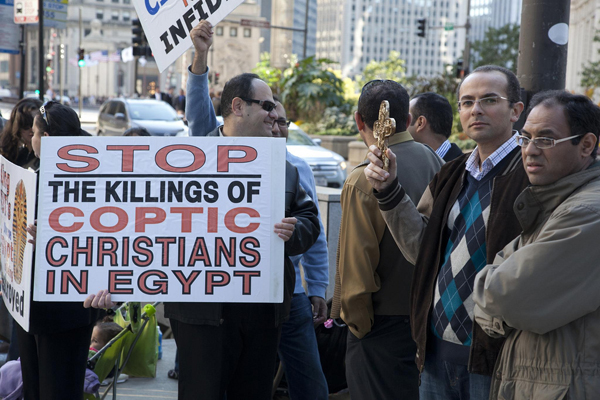
Earlier today, ousted Egyptian president Mohamed Morsi appeared in a Cairo court to face criminal charges stemming from a prison break in 2011 - just days after al-Qaida's leader asked Egyptian Muslims to not punish Christians for their role in Morsi's removal.
In quotes provided by the Associated Press, Ayman al-Zawahri told militants via audio message that rather than to focus on Christians, they ought concern themselves with establishing an Islamic government in Egypt and with fighting the "Americanized coup" of Gen. Abdel-Fattah el-Sissi - the military leader who orchestrated Morsi's fall in July and who is likely to run for president in the next election.
Al-Zawahri continued, saying, "We must not seek war with the Christians and thus give the West an excuse to blame Muslims, as has happened before."
In June 2012, Mohamed Morsi became Egypt's first civilian president in Egypt's first competitive presidential election. He was backed by the Muslim Brotherhood, an Islamist group whose slogan is, "Islam is the solution."
Morsi was removed from power, in part, because
Since Morsi's removal from power, Egypt's Coptic Christians have been the target of often violent crimes. A month after the coup, The New York Times reported that a mob had looted two churches and a neighboring monastery. In another instance, at least three people were killed in a series of attacks on public buildings, including schools and an orphanage.
By October, reports concluded that 43 churches had been seriously damaged in the attacks. In some instances, the armed mobs chanted, "God is great" or "you Christian dogs" as they descended on the buildings.
The military-backed government did little to protect Christians, although Amnesty International urged authorities to conduct investigations into the attacks.
"Failure to bring to justice those responsible for sectarian attacks sends the message that Copts and other religious minorities are fair game," said Hassiba Hadj Sahraoui, Amnesty International's deputy director for the Middle East and North Africa. "The authorities must make it absolutely clear that sectarian attacks will not be violated."
Morsi supporters continue to protest his ousting and to call for him to be reinstated. Morsi himself, during today's trial apparently lost his temper and shouted at the judge, "I am the president of the republic, how can I be kept in a dump for weeks? Who are you? Who are you?"
There is currently no date set for the next presidential election, though candidates can declare their intention to run beginning Feb. 18.
What is clear is that a president will be elected before parliamentary pools. In fact, early this month, 98 percent of Egyptians approved a new constitution - one that calls for the presidential election to happen first.
The Muslim Brotherhood boycotted the constitutional referendum.
Abdel-Fattah el-Sissi is largely popular and favored to win. He would first, however, have to relinquish his current position as Egypt's minister of defense.
This week marks the third anniversary of Egypt's uprising against then-president Hosni Mubarak, whom Morsi succeeded. Both pro- and anti-government demonstrations took place Saturday, leaving at least 49 people dead and hundreds more in jail.
















